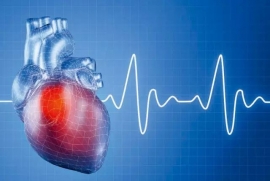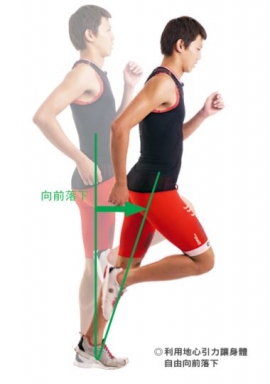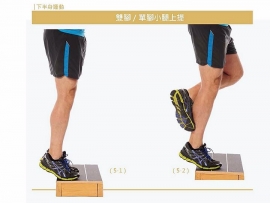在书上的“Factors Affecting Heart Rate at Rest and During Exercise”的小节中,首先谈到了休息状态下的心跳率,所谓的“静止心率(Resting Heart Rate)”,你可以长期收集这个心跳率来了解是否受伤、训练过度、恢复未完全等,也可以藉此了解你体能的进步。记录的方式很简单,早上起来,花个1分钟来量测身体的静止心率。
You’ll find this an invaluable tool, providing feedback on injury, illness, overtraining, stress, incomplete recovery, and so on. It is also a very simple gauge of improvements in fitness.
有几个因素影响休息与运动下的心跳率。而一般来说,影响“静止心率”有二个主要的因素“体适能(fitness)”与“恢复状态(state of recovery)”:
■ 体适能(Fitness)
Fitter people tend to have lower resting heart rates. Some great athletes of the past have recorded remarkably low resting heart rates. The reason for this is that, with appropriate training, the heart muscle increases in both size and strength. The stronger heart move more blood with each beat ( this is called stroke volume) and therefore can do the same amount of work with fewer beats. As you get fitter, your resting heart rate should get lower.
(当你经过适当的训练之后,心臟肌肉在大小与肌力都增加了,心臟在每一个跳动下可以输出更多的血液量,因此可在较少的跳动下,却可以完成相同的总量。因此,愈是强健的人,静止心率应该愈低。)
■ 恢复状态(State of Recovery)
After exercise, particularly after a long run or bike ride, several things happen in the body. Fuel sources are depleted, temperature increases, and muscles are damaged.
All of these factors must addressed and corrected. The body has to work harder, and this increased work results in a higher heart rate. Even though you might feel okay at rest, your body is working harder to repair itself, and you’ll notice an elevated heart rate.
Monitoring your resting heart rate and your exercise heart rate will allow you to make appropriate adjustments such as eating more or taking a day off when your rate is elevated.
(在运动之后,尤其是长程的跑步或自行车,身体必须增加心跳率来修复体内损耗,包括能量消耗殆尽、体温上升及肌肉损坏。即使在休息状态下,身体没有不适,而身体仍持续的在进行复原的工作,可以注意到心跳是上升高的。)
There same factors of recovery and injury also affect heart rate during exercise. The factors that elevate resting heart rate also elevate exercise heart rate. If you’re not fully recovered from a previous workout, you might notice, for example, at your usual steady-state pace, an exercise heart rate that is 5 to 10 bpm higher than normal. This usually accompanied by a rapidly increasing heart rate throughout the exercise session.
(若身体没有得到足够的恢复,心跳率升高的现象会影响带进到训练期间。比方说,在步伐进到稳定状态时,心跳率会高出过去正常训练时的5至10 bpm。)
此外,对于运动时的心跳率,“温度(Temperature)”影响非常之大:
Warmer temperatures cause the heart to beat faster and place considerable strain on the body. Simple put, when it is hot, the body must move more blood the the skin to cool it while also maintaining blood flow to the muscles. The only way to do both of these things is to increase overall blood flow, which means that the heart must beat faster.
(天热时,皮肤血管扩张,使得流到皮肤的血液要更多,增加体热的散失,以维体温;同时,必须维持流往肌肉的血流量。为了进行这二件事,唯一的方式是加快心跳率来增加整体的血流量。)
Depending on how fit you are and how hot it is, this might mean a heart rate that is 20 to 40 bpm higher than normal. Fluid intake is very important under these conditions.
(取决于健康状况与天气的温度,心跳率也许比正常状况多出20~40个 bpm。在这个情况下,水份的补充是非常重要的。)
Sweating changes blood volume, which eventually can cause cardiac problem. The simplest and most effective intervention to address high temperature and heart rate is regular fluid intake. This helps to preserve the blood volume and prevent the heart from beating faster and faster.
(此外,流汗会改变血量,最后可能造成心臟的问题。最简单也是最有效的面对方式就是定时的补充水份,保持血量并且防止心跳愈来愈快。)
另外一个影响运动的心跳率是“年纪(Age)”:
In general, MHR will decline by about 1 bat per year starting at round 20 years old. Interestingly, resting heart rate is not affected. This is why the basic prediction equation of 220 – age has an age correction factor. We have coached and tested thousands of athletes, and general trend is that athletes of the same age who produce higher heart rates often have higher fitness scores. However, your HMR is what it is, and you cannot change it.
(大约从20岁开始,最大心跳率每年会减1,而静止心率不会影响。根据带过与测试数以千位的运动员,同年纪的运动员,拥有较高心跳率通常也代表有较好的体能状况。然而,你无法改变最大心跳率。)
最后一个是影响因素是“性别(Gender)”,女性被认为心臟的尺寸与肌肉比男性小,所以有较高的最大心跳率,但这种观点尚未有定论。



